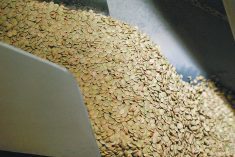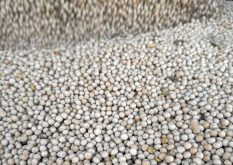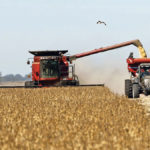Hog prices slip
United States hog prices declined from a high of $28.50 (U.S.) per hundredweight live on Feb. 22, when a winter storm reduced marketings, to $27 later in the week in response to the weaker wholesale pork market, said Manitoba Agriculture.
Kevin Grier, in the Canadian Pork Market Review newsletter from the George Morris Centre at Guelph, Ont., said U.S. slaughter could edge up to more than two million again in March and that could hurt prices.
Also, there is lots of pork in cold storage and this will keep a lid on any chance of a quick rise in cash hog prices.
Read Also

Moe shares goals for Chinese trade mission
To advocate on behalf of Saskatchewan agriculture and other industries, as well as the Canadian canola, pork, pulse, and seafood industries, Saskatchewan Premier, Scott Moe, is travelling to China on a trade mission.
In Canada, strong packer competition is helping to keep prices closer to the American price than they normally would be at this time of year.
Glenn Grimes and Ron Plain, agricultural economists at the University of Missouri, said in their weekly newsletter that prices won’t climb back to the low $30s per hundredweight until April.
Cattle prices rise
Fed cattle prices rose through last week.
A few more fall-placed calves were in the mix, which helped the overall average price, said Canfax.
However, the older, rough or heiferette-type cattle made for wide price ranges. The steer average gained $1.50 per cwt. while heifers were up 50-75 cents due mostly to few of good quality.
The U.S. showed its strongest interest this year and some cattle moved south. Volume sold was about the same as the previous week at 12,700 head.
Alberta prices on Feb. 25 were steers $88-$90.60 per cwt., flat rail $152.60 and heifers $84-$89.25.
Packers slowed their slaughter last week to avoid poor margins.
Year-to-date slaughter is up two percent mostly due to increased capacity in Western Canada. Canfax said the good news is that due to lighter carcass weights than 1998, total tonnage is unchanged.
Wholesale beef prices were steady to 50 cents per cwt. lower for the week, with Montreal at $154-$156.50 and Calgary at $150-$157.50 on handyweight steers.
Canfax said the solid U.S. floor price should keep local packers bidding competitively.
Market-ready supplies are expected to remain light through the rest of the quarter. The favorable prices will help keep feedlots current and that means lighter carcass weights.
The market could rise about $1 per cwt. this week, Canfax said.
The improved fed market did not help the cow market where sluggish boneless beef movement is a key problem. Feeder cattle prices were mostly steady to $1 per cwt. lower on all weight categories. But the spread continues wide with buyers willing to pay for good quality cattle.
Continued strength in the fed cattle market could fuel feeder prices. Stronger U.S. feeder cattle prices and the lower Canadian dollar could also have more impact, Canfax said.
In the stock cow trade, bred cows had a price spread of $500-$1,280. Bred heifers were priced from $900-$1,260. Cow-calf pair sales were few and far between, but ranges were reported from $900-$1,375.














